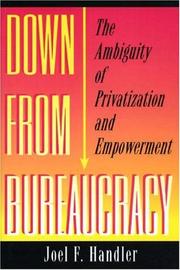| Listing 1 - 2 of 2 |
Sort by
|
Book
ISBN: 0691093636 1322883440 0691613486 1400868742 0691028184 0691641277 9780691093635 Year: 1975 Publisher: Princeton, N.J.: Princeton university press,
Abstract | Keywords | Export | Availability | Bookmark
 Loading...
Loading...Choose an application
- Reference Manager
- EndNote
- RefWorks (Direct export to RefWorks)
Since the end of the civil rights era in the sixties it has become increasingly clear that social and political conflicts cannot be resolved entirely at the national level. Struggles between residents of poor neighborhoods and local interest groups or public authorities present some of our most explosive domestic political problems today. This study seeks insight into these problems through an analysis of efforts during the sixties to organize the poor to pursue their interests in local decision-making processes. David J. O'Brien holds that both organizers and scholarly observers of the grass-roots movement have failed to understand properly the process by which interest groups are formed. Arguing that the demise of neighborhood organization cannot be attributed to supposedly unique social, psychological, or cultural characteristics of the poor, he develops an analytical framework that emphasizes the strategic role of incentives and organizational resource problems. This framework helps explain not only the failure of organizers in the sixties to grasp the problems of interest group formation, but also the assumptions that prevented them from identifying the source of their frustration. The author assesses the different approaches that have been taken to neighborhood organization, and outlines a model for future efforts.Originally published in 1976.The Princeton Legacy Library uses the latest print-on-demand technology to again make available previously out-of-print books from the distinguished backlist of Princeton University Press. These editions preserve the original texts of these important books while presenting them in durable paperback and hardcover editions. The goal of the Princeton Legacy Library is to vastly increase access to the rich scholarly heritage found in the thousands of books published by Princeton University Press since its founding in 1905.
Community power --- Community organization --- Poor --- Political sociology --- -Community power --- -Political sociology --- -#SBIB:316.8H30 --- #SBIB:316.8H23 --- Disadvantaged, Economically --- Economically disadvantaged --- Impoverished people --- Low-income people --- Pauperism --- Poor, The --- Poor people --- Persons --- Social classes --- Poverty --- Mass political behavior --- Political behavior --- Political science --- Sociology --- Elite (Social sciences) --- Local government --- Power (Social sciences) --- Sociology, Urban --- CBOs (Community organization) --- Community-based organizations --- Community councils --- Community life --- Professies en methoden in het welzijnswerk: sociaal werk, vrijwilligerswerk, hulpverleningsmethoden … --- Welzijnsorganisatie: samenlevingsopbouw, opbouwwerk --- Economic conditions --- Sociological aspects --- #SBIB:316.8H30 --- Political sociology. --- Community power - United States --- Community organization - United States --- Poor - United States

ISBN: 0691044619 9786612753022 1400821983 1282753029 140081197X 9780691044613 9781400811977 1400803403 1400816327 Year: 1996 Publisher: Princeton, N. J. ; Chichester Princeton University Press
Abstract | Keywords | Export | Availability | Bookmark
 Loading...
Loading...Choose an application
- Reference Manager
- EndNote
- RefWorks (Direct export to RefWorks)
Throughout the world, politicians are dismantling state enterprises and heaping praise on private markets, while in the United States a new rhetoric of "citizen empowerment" links a widespread distrust of government to decentralization and privatization. Here Joel Handler asks whether this restructuring of authority really allows ordinary citizens to take more control of the things that matter in their roles as parents and children, teachers and students, tenants and owners, producers and consumers. Looking at citizens as stakeholders in the modern social welfare state created by the New Deal, he traces the surprising ideological shifts of empowerment from its beginning as a cornerstone of the war on poverty in the 1960's to its central place in conservative market-based voucher schemes for school reform in the 1990's.Handler shows that in the past the gains from decentralization have proved to be more symbol than substance: some disadvantaged members of society will find new opportunities in the changes of the 1990's, but others will simply experience powerlessness under another name. He carefully distinguishes "empowerment by invitation" (in special education, worker safety, home health care, public housing tenancy, and neighborhood organizations) from the "empowerment by conflict" exemplified by the radical decentralization of the Chicago public schools. What emerges is a map of the major pitfalls and possible successes in the current journey away from a discredited regulatory state.
Community power --- Decentralization in government --- Decentralization in government. --- Power (Social sciences) --- Privatization --- Schools --- Welfare state. --- Decentralization --- Administration publique -- Décentralisation --- Autonomie administrative --- Bestuurlijke decentralisatie --- Centralization in government --- Decentralisatie (Bestuur) --- Devolution in government --- Décentralisation administrative --- Décentralisation technique --- Décentralisation territoriale --- Etat providence --- Gouvernement décentralisateur --- Government centralization --- Government decentralization --- Government devolution --- Politique de décentralisation --- Staat [Welvaarts] --- State [Welfare ] --- Welfare state --- Welvaartsstaat --- État -- Décentralisation --- État décentralisé --- -Decentralization in government --- -Power (Social sciences) --- -Privatization --- -Schools --- -Welfare state --- #SBIB:35H100 --- #SBIB:AANKOOP --- State, Welfare --- Economic policy --- Public welfare --- Social policy --- State, The --- Welfare economics --- Political science --- Central-local government relations --- Federal government --- Local government --- Public administration --- Public institutions --- Education --- Public schools --- Denationalization --- Privatisation --- Contracting out --- Corporatization --- Government ownership --- Community organization --- Elite (Social sciences) --- Sociology, Urban --- -Bestuurlijke organisatie: algemene werken --- United States --- Politics and government --- 20th century --- Illinois (Etat) --- Chicago (Ill.) --- Decentralization in government - United States. --- Community power - United States. --- Power (Social sciences) - United States. --- Bestuurlijke organisatie: algemene werken
| Listing 1 - 2 of 2 |
Sort by
|

 Search
Search Feedback
Feedback About UniCat
About UniCat  Help
Help News
News